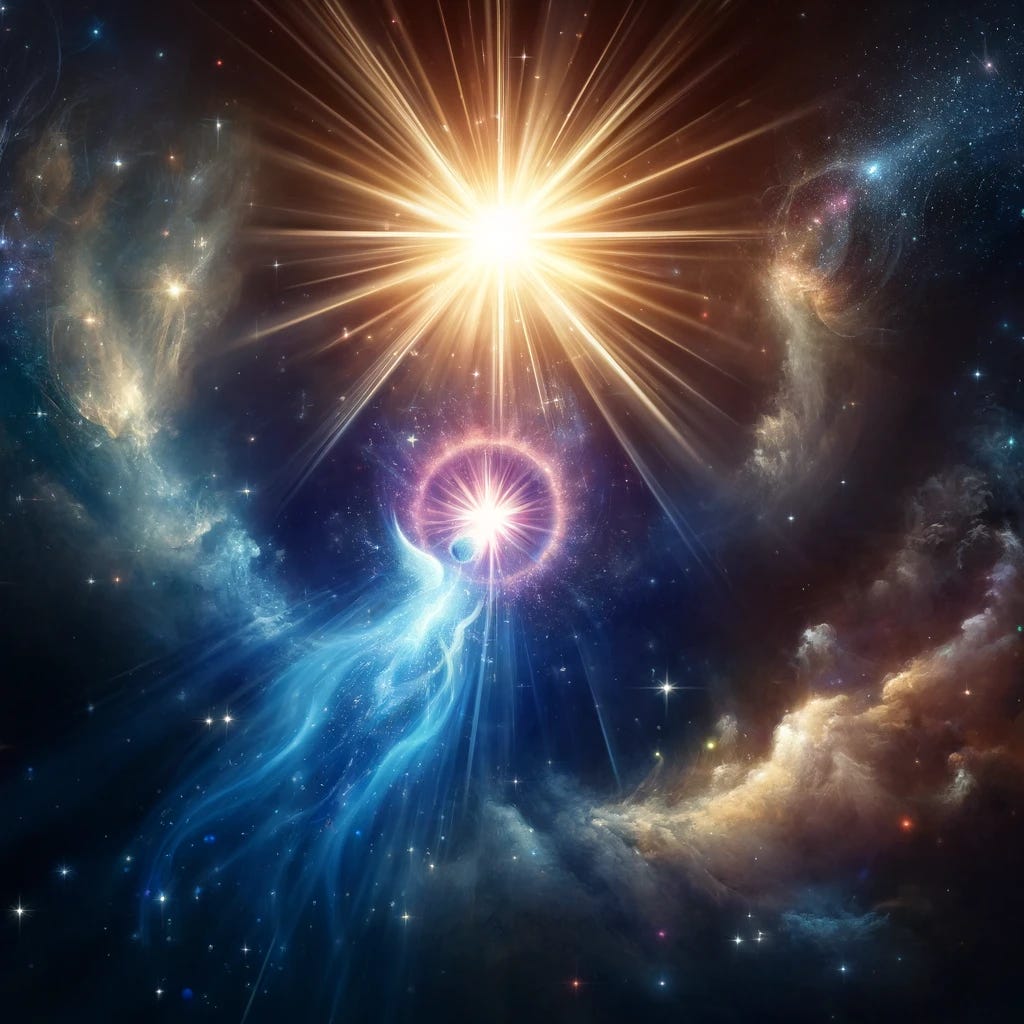“One must still have chaos in oneself to be able to give birth to a dancing star.” – Thus Spoke Zarathustra
Today, I want to share with you the most ambitious and holistic summary of my philosophy. And if you have the courage and interest, I want to share with you my recipe (that I synthesized from Nietzsche, Althusser, Gödel, Kuhn… and countless others) of how to become who you are (trust me, it will be fun. Or for the very least, very insightful. I would even hazard, paradigm-shifting).
You guys do not know it yet (unless you spent more than 20 minutes with me, then you surely would), but I like Nietzsche more than a Reddit atheist. And one book in particular has a special place in my heart: Thus Spoke Zarathustra.
The Three Metamorphoses is the first chapter of Nietzsche’s Thus Spoke Zarathustra, and the one that has been the most impactful for my life; it’s the one I preach the most.
“OF THREE metamorphoses of the spirit do I tell you: how the spirit becomes a camel, the camel a lion, and the lion at last a child.”1
It is a single page. If I were you, I would just leave this Substack and go ahead and read The Three Metamorphoses. In case you (probably) won’t, I will touch upon it right here: we are all born with a table of values, usually stemming from religious or cultural ethos (e.g. ethics of Judeo-Christians, Taoism, Islam), and we are laden with it like a camel. Humans at large are content being camels, and do not question the axioms that have been decided for them by an accident of birth. Such camels carry the weight of the circumstances of their birth on their back.
Then comes the second stage of the metamorphosis, where the camel becomes a lion: the lion emerges as an iconoclast, the lion will “philosophize with a hammer,” and let no idol, no “commandment”, no “Thou-shalt” define what the lion can do. The lion simply says “I will!”. The lion, though powerful in its destruction, creates a vacuum, and you know what they say about nature and the vacuum: Nature abhors a vacuum. Consequently, nihilism follows the lion stage of the metamorphosis, and the nihilism that follows necessitates formation of new values. That is when the lion is morphed into a child: a child that is able to look at the world anew, that can now decide independent of all prior weight the camel was laden.
To become, and — more importantly — to remain a child is to become superman, to become self actualized. Look around you, at all the people that you know: some camels, a few lions, and yet fewer children. And you know some camels, that became lions, only to take on new weight and respawn as a camel once again to fit into a group, a society (astrology, left wing campus political groups, right wing conspiracy theory groups). The biggest challenge in this journey is to stay humble: that is the only way one remains a child. Only a child can reason from first principles with the humbleness of the knowledge that they know nothing, as Socrates did. And yet more importantly, a child will even question the first principles.
It is actually quite amusing that in one of Russell’s essays he likens the process of philosophizing to repeatedly asking the question “why” akin to a stubborn child, until a barebones “why” is reached, which can then be taken as an axiom. This actually is probably the best way someone can reach any healthy system of thought, for that is when they have gotten closest to having given up all their assumptions.
Wish it were that easy, but there is a titan standing between us and becoming superman: the titan of ideology.
Let’s talk a little bit about Althusser. Despite being French, he makes a pretty insightful analysis of how ideology functions. In his essay Ideology and Ideological State Apparatuses, Althusser talks about how ideology permeates all aspects of society. Or as he would put it:
“There is no practice except by and in an ideology.”
This is not necessarily a novel thesis, and many philosophers before Althusser (e.g. Kant, e.g. phenomenologists) made similar observations. Kant, with his noumena (thing-in-itself) and phenomena distinction, talked about how much perception can cut into the essence of an object (not deeply). Let us explain it with the current understanding of evolution. Our perception of food is tinted by what is evolutionarily advantageous for us: e.g., when we see color and taste calorie-dense food as desirable and sweet, it is not because that’s the qualia that is the most “correct” reflection of the nature of the object we are perceiving. It is just evolutionarily advantageous for us to perceive the nutritious food in that way, so that we keep on taking in calories to survive. The nature of the object (the thing-in-itself) is completely impenetrable to us: the phenomena we experience of the object are at best an approximation, and at worst an illusion of it.
Althusser makes a similar point to Kant (and the phenomenologists); we have always carried, and will always carry a lens through which we understand and evaluate the world. This means that as much as we want to rid ourselves of an ideology, there is no objective point of view that is devoid of ideology.
Well now, that is bleak, isn’t it? How shall a lion emerge, if there is no way for the camel to unload its load? Doesn’t Althusser’s thesis suggest that as soon as a camel unloads, new loads (ideologies) would take its place? To understand why, let’s look at another one of Althusser’s theses:
“Ideology represents the imaginary relationship of individuals to their real conditions of existence”
Ideologies provide us with frameworks that help us make sense of life: the whole unstructured stimulus that is life finds meaning once you throw the grid of ideology over it. Without making sociological, social, historical analysis, it is impossible for us to make sense of how to proceed in life, what decisions to make.
I believe with all my heart that breaking out of an ideology is excruciatingly painful, tremendously difficult, and, for most people, outright unattainable.Imagine for a second that the whole world-understanding you have built is about to be completely toppled like a Jenga tower when its foundation pieces are pulled out, leaving you in the rubble of your once-solid self-consistent beliefs. And you sit there in the debris, unable to make sense of life through any framework, since the only one you had just collapsed. Such is the tragedy of the lion.
How does one, then, break out of an ideology? Let us get a little personal then, shall we?
Most of us growing up in religious circles would learn life to be a miracle of god. As we go through positivist education, learning more about biology, physics, and chemistry, we realize that what we call life in a cell needs no god: the life in a cell is just a collection of self-perpetuating chemical reactions. The thing that we call destiny (or the so-called “god’s plan”) is not dictated by god, but by the deterministic laws of physics (“wHaT aBoUt QuAnTuM!?” Jesus f Christ… just stfu). The god of the gaps gets smaller and smaller. It is possible to say that god has set up the cell so that it can have the self-perpetuating chemical reactions, and that god provided the force from the beginning, but is it not comical to try to alter the definition and role of god so that we desperately hold on to an ideology we only subscribe to not because we rationally came to the conclusion of, but because by the accident of birth we were born into a society that believed in our particular god, with its random set of rules and roles it occupies? What about the problem of evil? Does it not seem infinitely easier to just do away with an ideology that provides us with more questions and convolutions trying to make sense of the world, and embrace the positivist ideology that explains the world way more simply?
Thomas Kuhn would have been proud, for this is a paradigm-shift. Let us succinctly draw the parallel here: a paradigm shift happens in science when an existent paradigm, while before was able to explain and account for most problems science was attempting to solve, now, upon further scrutiny, as problem space gets more complex, is unable to account for anomalies. As the list of anomalies and complexities that the current scientific paradigm is unable to resolve grows, alternative paradigms are sought, in the hope that they can build a scientific paradigm, a set of postulates/axioms that does not suffer from the shortcomings of the previous paradigm. And sometimes, it happens that the new paradigm, which rejects the long-standing presumptions of science, provides a better world-model. Look at the most famous example that Kuhn himself talks about in his The Structures of Scientific Revolution: the Copernican revolution. As natural as it was for humans to assume an Earth-centric model (given all heavenly bodies were going in circles around them), the math for representing planetary motion got overly complex to represent. That is, until Copernicus threw away the entire framework, and made an assumption that was senseless: let us assume a heliocentric cosmological model, with planets (of which, Earth is but one) revolving around it. Suddenly, making sense of planetary motion became simpler and our models became more accurate.
It must be clear to the reader that a paradigm is but an ideology. It has presumptions, and it tries to provide structure to the raw sensory data we observe of the world. However, the paradigm and ideology chosen are not done in a vacuum; they have emotional and sociological valence. One must be comfortable being a heretic if one is to reject a long-standing framework one is standing on, and work from first principles, and when the first principles do not provide the needed framework, like a lion, throw away the first principles, and like a child that looks at the world anew, postulate new first principles.
One last example is in order, and for this, we will look at the limitations of sufficiently strong formal systems and talk about Gödel’s incompleteness theorem. I think this essay could do without visiting this topic, but then again, there is no professor, no word limit, nor an authority that can stop me from going into it, so we will, because I will it (and remember, you’re not my mom!). If you are actually interested in learning about the incompleteness theorem, maybe the best source that will help you understand and internalize the theorem is the infamous book Gödel, Escher, Bach: an Eternal Golden Braid. It was repeatedly recommended to me by a respected cognitive science professor during college, and it took me 4 years to finish the book, but I understand so much more about math, logic, and formal systems in general than I did before reading it. I will give an unfairly short summary here, so feel free to skip this section if you’re a nerd that already knows it. For those nerds among us still reading, let us carry on.
When I first understood (and I use that word loosely) the incompleteness theorem, that there are theorems in a sufficiently strong formal system that are not decidable from a set of axioms of that formal system, I was mind blown (I am positive I am not alone). That eroded so much of my trust in math and science: the conclusion is a pessimistic one; it suggests that it could be the case that we cannot find all mathematical “truths” simply by reasoning from first principles. Let us use the Collatz Conjecture as an example for our explanation. The Collatz Conjecture states that if you start with a number n, you apply the following two rules repeatedly: if n is even, calculate n/2; if n is odd, calculate 3n+1. The Collatz Conjecture claims that you will always reach a cycle (e.g., n=7, apply odd rule: 22, apply even rule: 11, apply odd rule: 34, then 17, then 52, 26, 13, 40, 20, 10, 5, 16, 8, 4, 2, 1, 4, 2, 1… [we just reached a cycle]). This is a mathematical pattern that is easy to observe, but we have yet to prove this conjecture from first principles, or ZFC axioms (so far).
The bleak implication of the incompleteness theorem is that we may never be able to. Then we do not have grounds for believing whether this holds for all n. Maybe. Maybe not.
While I am unqualified in making a statement about formal systems (and I still will do so anyway), I believe that this probably is a broad interpretation of the incompleteness theorem. Again, apologies for being vague, but the incompleteness theorem depends on a formal system’s ability to make a statement about itself; it uses itself to talk about itself and comes up with statements that are true but unprovable. I believe that this is not a technique that completely demolishes the pillars of science and math, but a gimmicky way to come up with unprovable theorems within a formal system. It depends on making sense of a formal system using its own paradigm. I would say that this is misguided and it is impossible to make intelligent statements about a system from within that same system. The formal system being utilized should be replaced altogether, or a new axiom disallowing “introspection” of the formal system should be added to it as an axiom (I do not know, I haven’t studied SymSys at Stanford; I bet they all understand the theorem so perfectly). Here is, however, an alternative reading on the incompleteness theorem. What Gödel’s incompleteness tells us might be “you cannot make meaningful statements about a system from within the system, such are the limits of formal systems.”
Going back to our three metamorphoses (and getting a little further away from formal logic, thankfully), is it now clear why it is so difficult to break out of ideology? It is highly parallel with trying to make sense of a system from within the system; the conclusions it leads you to are absurd, possibly misguided. And proposing new paradigms that can resolve such absurdities is hard: they do not come out of the box like Ikea furniture; you will need to devise and build them on your own, and the world will give you no manual. Thankfully, our job is a little easier than building a formal system. All you have to do is recognize that you exist in a paradigm, or an ideology that you have been laden with, by the accident and circumstances of your birth. To be a lion, you cannot just question the conclusions you have reached utilizing your ideology; you need to take the leap of unfaith and reject your ideology/paradigm stemming from your context altogether. And trust me, I know it is scary: you will have no means to make sense of the world; it will be nihilistic, and you will have no branch to hold onto. But then, once you sit with the feeling of that nihilism, you will recognize it is not as hopeless as you might think. What is more, you will emerge with a completely new sense of freedom and the peace that comes with acknowledging the complexity and nuance of life, and you will understand all too well that there are many ideologies that look at the same issue and just extract different principal components of them. You, if you are to become superman, then, hold the ultimate power: it is not to find refuge in yet another school of ideology, but to take comfort in this nihil and emerge as an ever-young and ever-curious child, looking at frameworks and ideas critically, with the acknowledgment of your own ignorance.
It is not a coincidence that the Oracle of Delphi declared Socrates the wisest man in Athens for knowing he knew nothing. Such is the nature of superman: the insatiable hunger and daunting curiosity of a true child that will don you the wings of true freedom. And once you embrace that child that lies within you, you will inevitably give birth to a dancing star.
All images created by Dall-E









very 2019 burn... both topic and aesthetics! before your time xox
great piece!! what are some ways one can evaluate what stage of the metamorphosis one is at though?? are there specific behaviors/thoughts/frameworks that can indicate being in a certain stage?